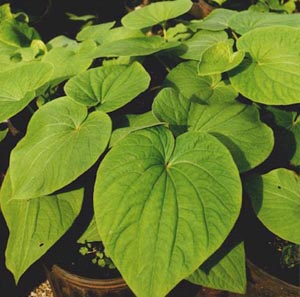I received a very heartfelt message from a customer last week reminding me of how important it is for us to be clear about the type of kava we grow and sell, and exactly how it is processed, here at Kona Kava Farm. This is so important because certain parts of the kava (Piper methysticum) plant should never be used, namely the tops (flowers), and branches. Only the rhizome, or rootstock, should be used.
This customer’s note was a very much-needed wake-up call for me, since it made me realize we did not have a lot of information on our website about the dangers associated with the toxic parts of the kava plant, which we here on the farm never even harvest. There are a lot of rumors floating around kava. Now that I have turned my focus to communicating the wonders of kava to the world through this strange, isolated, online universe, I appreciate the reach this medium has, since it allowed a customer to reach out to us with their concerns.
The letter stated, in part: “I want to buy your Kava Kava knowing it is grown and handled by American citizens, which tells me that it hasn’t been cut with some inert root that makes it ineffective and useless. I have fibromyalgia and I want to try it to reduce this pain, since there is nothing else that will work without either terrible side effects or addiction to something. If you can tell me that your Kava Kava doesn’t contain any part of the plant tops including woody twigs, I’ll be so happy to have found decent Kava Kava.”
I can assure you, we here at Kona Kava Farm strive to serve as a reminder of what kava “should” be. On the other end of the spectrum, at the start of the 21st century, unscrupulous manufacturers of kava products from Germany put out items for human consumption that contained an extract of the tops of the kava plant, which is very toxic to the liver. As a result, people got very sick and some died.
In addition, these careless, slipshod companies often employ dangerous chemical processes such as acetonic and ethanolic extraction methods which have been shown to be possibly responsible for liver toxicity. These terribly irresponsible, even criminal, acts by these companies now have them defending themselves in court due to their negligence. Numerous studies and clinical trials have proven that water-based kava extracts, such as what we use here on the farm, are not toxic.
To allay any fears or doubts, I thought it important to explain how we here at Kona Kava Farm grow, harvest and process our kava. Since we do not harvest the fruit or the flowers from the plant, we are able to harvest year round. We harvest rootstock that is a minimum of three inches thick, although we have harvested some roots that were six inches thick, and we take care to use ONLY roots and rhizomes. In fact, we are so careful, that we get about 20% less dried kava per plant because we steer absolutely clear of anything but the most potent, safe parts of the plant.
As we harvest the roots, they are cut on site into small pieces that weigh just a couple of ounces each. This allows for quick and even drying, although it is important to note that in order for kava to remain at its maximum potency, like a good cigar, it needs to retain some moisture. If you are buying kava from anywhere, make sure it’s in a sealed foil pack! All of our plants are dried naturally, in the sun by Mother Nature, and this is another one of those personal steps in harvesting that we feel makes such a difference in the final product. We are also convinced that this is also why our root is often “sweet” and that’s saying a lot for this bitter root!
So, I hope that provides you with some useful information, and informs you about our kava here on Kona Kava Farm. Remember, if you have any questions or concerns, please write me. That’s what I’m here for!
Aloha no,
Makaira
One Comment
Trackbacks/Pingbacks
- Kava Article Library - KEITH CLEVERSLEY - […] Kava and Liver Toxicity Aloha! I received a very heartfelt message from a customer last week reminding me of how…







hey i was recently at a friends house and one of the elders was telling us about kava. so later that night i had to go online to check it out. what do you know a kava sight. i just wanted say thanx for all the information you have provided on your sight and because of that i would love to help out the kava farm